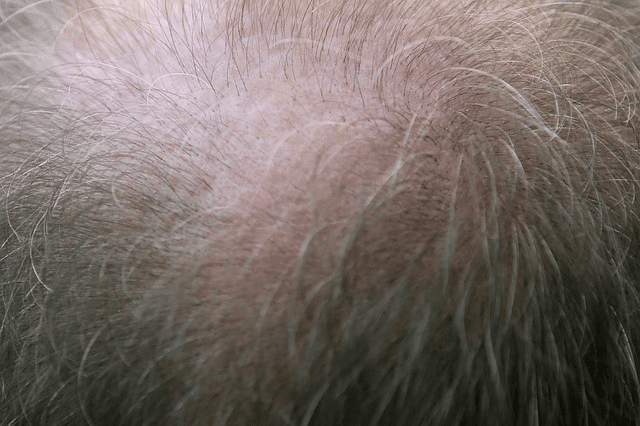Your hair loss concerns may be justified if you see an increase in the amount of hair caught in the shower drain or on your brushes. Many health problems can cause hair loss; thyroid disease is one of the most common ones.
Hair thinning due to hypothyroidism can be treated and reversed, despite the condition’s prevalence as a cause of hair loss.
Let’s look at the link between how well your thyroid works and hair loss. We also talk about symptoms, some possible treatments, and other necessary information for hair loss caused by hypothyroidism.
What is the relationship between thyroid function and hair loss?
Thyroid-related hair loss happens when a person has a long-term hormonal imbalance caused by the thyroid acting strangely. In short-term thyroid conditions, hair loss seems to happen much less often. The thyroid hormones control a lot of essential things, like body temperature, the rate of metabolism, the health of bones, and the rate of the heart. Hair loss can be caused by the thyroid gland that is either too active (hyperthyroidism) or not active enough (hypothyroidism). It happens ten times more often in women than in men, but men can also get an underactive thyroid.

The thyroid hormone is a very important part of hair growth and healthy. Hair follicle is the tiny sacs under the skin where hair growth originates from. Stress from the illness causes all hair follicles to enter their resting phase, stopping hair growth. The different hair follicles are at different phases of their growth cycle at any given time because human hair growth is not coordinated in the same way. When hypothyroidism or hyperthyroidism is severe or lasts for a long time, it can cause hair loss.
Hypothyroidism is when the thyroid gland doesn’t work enough or doesn’t work at all. Hyperthyroidism is when the thyroid gland works too much. In some cases of hypothyroidism, your pituitary gland is to blame because it doesn’t make enough of a hormone called thyroid stimulating hormone (TSH), which makes your thyroid hormones come out. Thyroid conditions can change the important hormones T3 and T4, which control a lot of things in the body, like regrowth.
Some antithyroid drugs, such as methimazole and propylthiouracil, can also cause hair loss as a side effect (PTUIronically, hat administering the hormone levothyroxine to treat an underactive thyroid might contribute to some hair loss, among other adverse effects; however, this tends to be more likely within the first month of treatment, and it occurs more frequently in children than in adults.
Hair Loss with Hypothyroidism Symptoms: what does it look like when you have thyroid-related hair loss?
Every day, some of our hair falls off, but we always see hair grow again. However, if your T3 and T4 hormones aren’t on optimal levels, it might disrupt the natural regeneration cycle of your hair, which may result in your hair becoming thinner over time without being replaced. This could also affect your body hair and eyelashes, in addition to your eyebrows.
It could come out in bunches or as individual strands. Additionally, it is possible that it is not coming from a single location, which would explain why it would not be visible at first.
It’s possible that you’ve also noticed a large amount of hair falling out in the shower or when you brush your hair. Significant hair loss is indicated when more than one hundred strands of hair are lost every day.
The American Academy of Dermatology says that it is normal to lose between 50 and 100 hairs every day. Even if the number of hairs you’re losing is normal, if your hair is thick or long, a few dozen strands might look like a clump. But what if your hair falls out?
Most of the time, hair roots make hair by moving around. For instance, the roots of the hair on the head usually grow hair for a few years and then stop.
When there is too much or too little thyroid hormone in the body, it can “shock the system,” causing hair fall.
Telogen effluvium is a disorder of the scalp in which the hair roots go into the resting stage of the hair cycle too early. During a state called telogen effluvium, as many as 70% of the hairs on the scalp can fall out in about 2 months.
People who have alopecia, a disorder that results in patchy hair loss, are more likely to have thyroid issues. Both lupus and polycystic ovary syndrome (PCOS) are known to induce hair loss. According to a study that was published in the International Journal of Trichology, increasing age is also connected with an increase in the amount of hair loss in the thyroid.
A good rule of thumb is that if you have alopecia or any other type of hair loss, but you do not have known thyroid disorders, it is wise to check with your doctor and request a thyroid gland test, blood tests at the very first sign of hair loss. This is because a thyroid disorders can cause hair loss in several different ways.
It is highly unlikely for hair loss to be the lone sign of either an overactive or underactive thyroid.
It is important to keep in mind that hair loss, in addition to the symptoms of hyperthyroidism and hypothyroidism, is vague and could be caused by other illnesses as well. Before a diagnosis can be made, an individual has to make an appointment with their primary doctor to have their thyroid levels evaluated.

Various options to treat hair loss
The truth is that hair loss caused by thyroid issues is typically transitory and may be repaired. This is especially true if you work with your endocrinologist to get evaluated and on the proper treatment for your illness. Many people worry that their entire head of hair will come out.
Even though it can be some time before you notice new growth, replacing lost hair with new growth as a result of using hypothyroid drugs to adjust your hormones might be helpful.
According to Amy Myers, MD, an author, and functional medicine specialist, you could want to ask your doctor for a full thyroid panel to check your TSH, free T4, free T3, and reverse T3. This is something that you should do to ensure that your thyroid is functioning properly.
These levels should be at their optimal levels, not merely what is considered “average.” What’s the big deal? Even with normal results, problems such as hair loss may still be present, especially with TSH and T4. After that, you and your doctor will need to work together to determine the type of thyroid medicine and the appropriate dosage for your particular thyroid hormone imbalance. Your endocrinologist will be able to guide you toward the treatment that is most appropriate for your symptoms.
Make it a point to consult a thyroid problem expert who is familiar with the intricacies of your illness. It is essential that you keep a record of your symptoms, make a note of the length of time that you have been taking your medicine, get regular examinations for your thyroid, and advocate for yourself when you go to your doctor’s appointments. If you continue to lose hair even after receiving medical therapy, you must enquire about every treatment possibility as well as each combo that can be effective for you.
As a consequence of this, working with your doctor to maintain control of your disease through the use of thyroid medication may result in your hair remaining thicker or regenerating growth. Because it takes time for hair first to begin and then grow, it is unlikely that you will see results right away.
Possible medications for hypothyroidism include:
– Doctors and experts would typically recommend that the patient take a superior form of hypothyroidism treatment including Natural Desiccated Thyroid or Desiccated Thyroid Extract with famous products of Real Thyroid and VitaliThy.
– Another drug is levothyroxine
During the time that you are on medicine, your thyroid levels will be monitored by your doctor. Surgical intervention might be required in some circumstances.
Within a few months of starting treatment, you might start to notice that your hair is growing back. Be aware that the newly grown hair may have a different color or texture from the rest of your hair in its natural state.
Natural and home-based treatments; avoiding unhealthy habits can treat many conditions.

You can attempt a variety of natural therapies in addition to prescription drugs to reduce hair loss or stimulate new hair growth.
Enhance iron deficiency
Your iron stores are correlated with your ferritin levels. Patterned hair loss may be exacerbated by low ferritin levels.
According to researchers, the body’s ferritin levels might be impacted by thyroid problems. Think about getting your iron and ferritin levels checked, then supplement as your doctor advises.
Correct nutritional deficiencies.
Even in the absence of a thyroid problem, nutritional inadequacies can contribute to thinning hair. Researchers indicate that the following factors may have a role in hair loss and retention:
B-7 (biotin) and B complex vitamins, zinc, copper, iron, vitamins C, E, and A, coenzyme Q10
A multivitamin may help you replenish your stockpiles. Too many supplements may cause hair thinning.
Eat healthily.
Consuming a diet that is primarily composed of easy to digest foods such as sweet, ripe fruit and seafood is essential for good health.
If you are being treated for hypothyroidism and consume calcium rich foods, you should aim to time them so that they are consumed at least four hours after your drugs for optimum absorption.
High quantities of muscle meat and fried foods are examples of processed foods that have the potential to trigger an inflammatory response. There is also a possibility that caffeine and alcohol are contributing factors. Especially if you are drinking black coffee on empty stomach. Your thyroid symptoms, including hair loss, may become more severe if you have inflammation.
Foods that fight inflammation should be included in your diet.
Both ginger and turmeric are considered to be anti-inflammatory foods that have the potential to boost endocrine function. Because your thyroid is a part of your endocrine system, taking measures to support it may help alleviate symptoms of thyroid issues.
You might want to experiment with using fresh ginger or turmeric root in your cookery. They are delicious in all kinds of dishes, from smoothies to stir-fries.
Think about using herbs.
Certain alternative medicine, such as herbalism, are effective in treating hair loss caused by illnesses such as alopecia. These herbs are intended to be consumed by mouth and include:
Red clover, chaste berry black cohosh, Dong Quai, false unicorn
Before attempting herbal treatments on your own, it is important to first consult with your doctor.
Watch how much iodine you consume.
People who suffer from autoimmune thyroid disease ought to be careful about the amount of iodine they consume. Iodine is a necessary component in the production of thyroid hormone, but an excess of it can cause hormonal disruptions.
Iodine is present in high concentrations in kelp and other types of seaweed, which may exacerbate symptoms such as hair loss. Always make sure to read the product label before taking any medication, as some cough syrups and multivitamins may also contain iodine.
Be gentle with the hair.
By taking care of your hair in the following ways, you can reduce the rate of hair loss:
Try to avoid squeezing your hair into braids, buns, or ponytails that are too tight.
Try to refrain from pulling or twisting your hair, especially brittle hair.
When untying knots, instead of using harsher brushes, a wide-toothed comb should be used.
If you switch up your routine just a little bit, you might be able to avoid pulling out your hair before it would have fallen out naturally.

Have patience: Thyroid hair loss reversal takes time
It could be several months before you detect any signs of regrowth. You might find this frustrating, but in the meantime, you could try covering your hair with a wig or another type of head covering.
Emotional support is also very important, so talk to your primary care physician about getting therapy or joining a support group where you can talk to other people who are going through something similar to what you are.
Conclusion: Thyroid dysfunction is connected with diffuse hair loss
Several underlying medical conditions could be the cause of hair loss, but they are mostly related to low T3 levels in the hair follicle or insufficient energy or nutrient supply to the hair follicle. It’s possible that, in addition to using home remedies, you’ll need to take medicine to see regrowth and cure the additional symptoms you’re experiencing.
If your thyroid is underactive, besides the popular levothyroxine, holistic doctors and endocrinologists now recommend a more effective form of hypothyroidism treatment such as Natural Desiccated Thyroid with famous products like Real Thyroid and VitaliThy.
After receiving the appropriate therapy, you should notice that your hair is thicker and fuller within a few months.
1 thought on “Hair Loss with Hypothyroidism”
Pingback: Hypothyroidism in children: Real Life Example - Thyroid And Metabolism